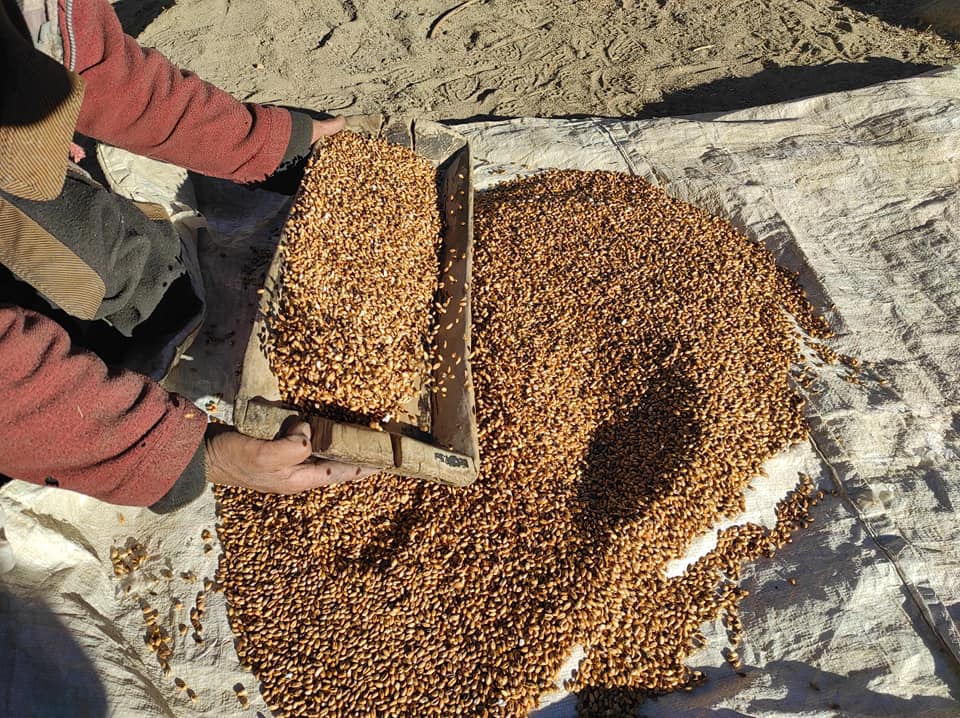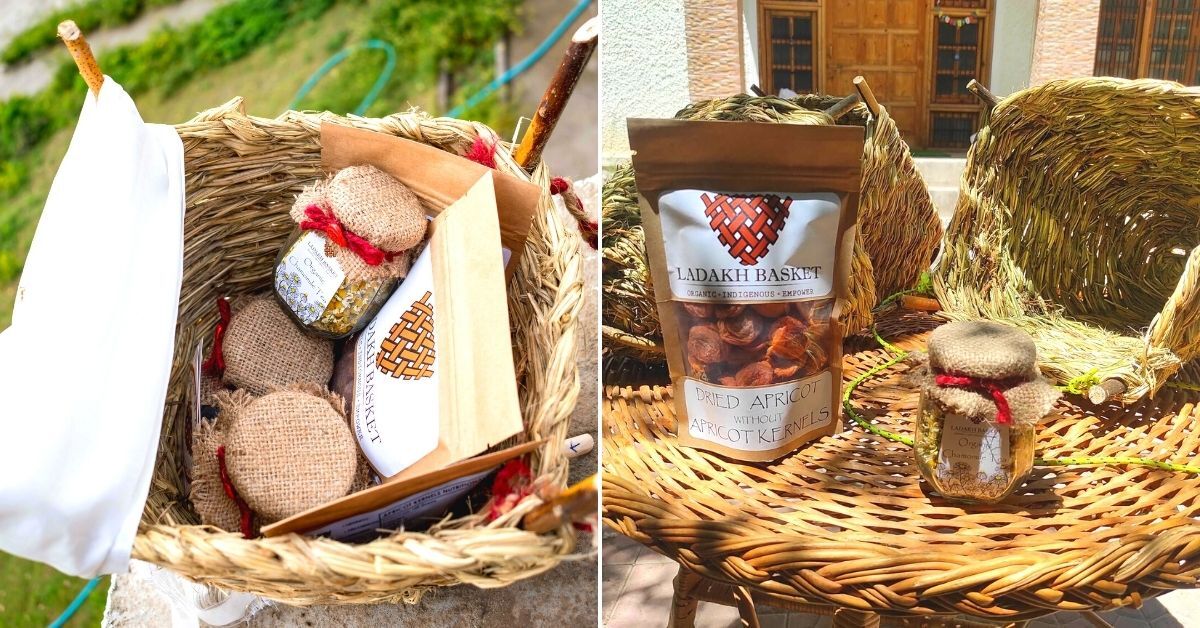On a summer day in July 2018, 30-year-old Thinless Norboo and his friends visited Hamya, a village in the Rong Changthang area of Leh district neighbouring his native Liktse (village).
During his visit to Hamya, Thinless realised that all the young women and men were missing. That’s when he came across three grandmothers, asking them where all the young people had gone. One grandmother replied that all of them had taken their livestock to graze uphill. However, as he began to enquire further, another grandmother remarked that she was joking and that all the young men and women had gone to Leh city for better economic opportunities.
“When one of the abilays (grandmothers) opened my eyes to how all the youth from the village had left for Leh leaving them behind for better economic opportunities, it hit me quite hard. That’s when I started thinking about what I could do for them to sustain themselves in their villages so that they don’t have to leave,” says Thinless, speaking to The Better India.
Later that year, he joined the Naropa Fellowship programme, a one-year course focussed on creating “agents of change” working towards “fostering an ecosystem of entrepreneurship and growth” while preserving the “heritage of Ladakh” and the larger Himalayan region.
It was at the programme, where Thinless, who holds a Bachelor’s degree in English literature, met Stanzin Jordan (30), a graduate of Buddhist philosophy and resident of Sankar in Leh, and Sonam Stanzin (28), an information technology graduate from Tangtse village, Changthang.
(Above image from Left to Right: Stanzin Jordan, Sonam Stanzin and Thinless Norboo)
The three young men harboured similar visions of starting a venture that would positively impact the lives of farmers in the region so that they don’t have to leave their homes. During the programme, they worked on ideas for a venture ranging from agro-tourism to sustainable greenhouses to help revive Ladakh’s fading food heritage.
They finally landed on the creation of Ladakh Basket, a local e-commerce venture conceived in June 2019, which seeks to preserve indigenous culture, promote organic farming and ensure farmers in Ladakh’s remotest corners have access to markets outside the region.
“Our vision is to preserve and showcase the unique narrative of its people and land through indigenous produce. Ladakh Basket is an online and offline platform, where we sell the region’s indigenous produce to the rest of the world. In doing so, we empower the local farmers to sustain themselves in their villages. We also aim to be sustainable by using environment friendly and reusable materials for packaging our products. We also conduct workshops, field trips and immersive learning sessions with the youth to share our knowledge,” claims Thinless.
Today, the products that they sell include organic chamomile tea, grounded barley, buckwheat, walnut kernels, peppermint tea, roasted wheat, goat cheese, organic apricot jam, etc.

Early Trials
The motivation of starting this venture came from witnessing local fruits and other produce not finding a sustainable market. Farmers from villages like Liktsey, according to Thinless, were earlier transporting their produce themselves and selling them on the streets of Leh city or seeking out brokers who would help them do the same. While transporting and selling their own produce was hard work, using brokers often ensured they wouldn’t get a good price.
Given the fact that nearly 62% of households in Leh district hold less than 1 hectare of cultivable land, according to this Ladakh Autonomous Hill Development Council-Leh report, most of them end up giving up farming altogether and move to cities like Leh in search of work.
While pursuing their respective fellowships, Thinless, Stanzin and Sonam began sourcing a variety of produce from their families’ farms. Post fellowship, the three of them also began reaching out to local farmers for merchandising their products on their platform.
“When we started out, there were some significant challenges. As a bootstrapped venture, we initially struggled with finances given our respective middle class backgrounds. With no external investment or government support, we took our time scaling up, but made sure the quality of produce was of a strong caliber that was well packaged. Of course, farmers also took their time to trust us since others like us had come to them in the past promising fortunes, but delivering nothing. Also, there were questions surrounding whether our finished products were ‘organic’ since we didn’t have the necessary certification. However, we were sure about our farmers and how they grew their produce organically,” claims Thinless.
Farmers Getting Their Fair Share
Ladakh Basket’s business model is essentially catered to the 26 farmers they source from villages including Liktse, Takmachik (certified organic village), Gya, Skurbuchan (certified organic village), Tarchit, Sankar, Tangtse, Fulak and Hamya in Leh district.
“We often offer farmers higher prices than they receive in Leh. For example, if wild caraway costs Rs 600 per kg in Leh market, we offer them Rs 800. Meanwhile, we sell high quality organic apricots for Rs 1,000 per kg, but source it from farmers at Rs 400 kg, which is the going market rate. Approximately, 40% of our revenue goes to farmers, 20% for logistics, and Ladakh Basket keeps the remaining 40%. We haven’t received any external funding so far, but are looking for grants and external investment to scale up our operations,” claims Thinless.
Farmer produce is brought to their small processing unit in the Choglamsar area of Leh town, from where orders are sent out. Their teas, apricots and buckwheat are in high demand. Every month, the venture claims to receive 35 orders with monthly revenues touching close to Rs 40,000.
View this post on Instagram
Speaking to The Better India, Tsering Namgyal, a farmer from Liktse, says, “Ladakh Basket has raised hope for farmers like us. Earlier, we didn’t have any formal platform to sell our produce, but now we do thanks to them. In 2020, I sold about 30 kg of black lentils to Ladakh Basket and this year, we have grown much more as a result.”
Meanwhile, Tsering Angchuk, an organic farmer from Skurbuchan says, “Now, we don’t have to visit Leh to sell our produce, which is primarily apricot, walnut and apricot kernels. Today, Ladakh Basket is buying our products in bulk, and this saves a lot of time and money for us.”

Helping Farmers Transition to Organic
When India was struck by the COVID-19 pandemic last year, many people went back to their village and got back to farming and other allied agricultural activities. The founders of Ladakh Basket saw this as an opportunity to promote organic farming in villages like Liktse.
“In my village, about three residents had died from cancer while another few were suffering from it. Speaking to locals, it was clear to us that the blame largely lay with the extensive use of chemical fertilizers. We were keen on not just promoting organic farming, but healthy living as well. In the following months, we organised workshops explaining to residents in villages like Liktse about the importance of organic farming, how it’s an integral part of our traditional way of life and the ill-effects of chemical fertilizers on their health. While residents thanked us for raising awareness, they initially couldn’t get off government-issued subsidies on chemical fertilizers. To help them get off it, Ladakh Basked invested Rs 30,000 to procure 300 sacks or organic manure for farmers in Liktse, distributed them to farmers and organised workshops. Thanks to our intervention, 90% of the farmers there decided to go fully organic,” notes Thinless.
This is an ongoing project for the venture across different villages working alongside farmers and other stakeholders, while they seek to grow their business further.
“Ladakh Basket began from my house in Liktse, and has grown to a point whereby we run a small processing unit and office out of Leh city. Now, we plan to grow the venture into offline stores as well. Our primary purpose of working on the Ladakh Basket is to empower locals and give them a platform for selling their local produce. Another important purpose we have is to design and promote our local products that represent the rich culture and heritage of Ladakh. In the long term, we hope to fulfill our mission for the people of Ladakh,” he adds.
You can visit their website and place your order. Ladakh Basket takes orders from all over India, and dispatches them through speed post.
(Edited by Yoshita Rao)
No comments:
Post a Comment